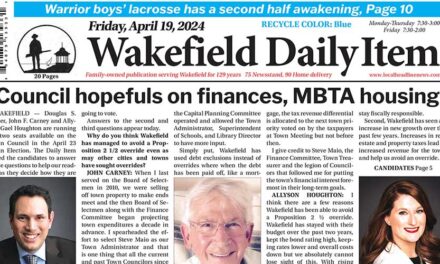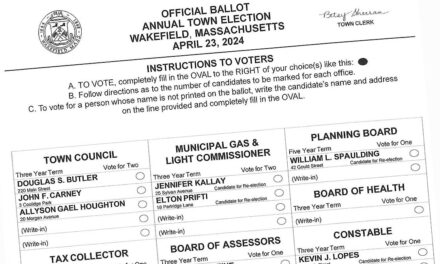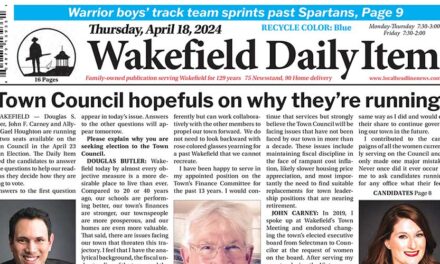By GAIL LOWE
WAKEFIELD — Most people, when hired for a new job, receive, in addition to salary, a benefits package that includes a health insurance plan, 401K plan, vacation time and sick days.
Some people, however, are not given sick time. These are people who work for restaurants, for instance or businesses that employ few workers.
Question 4 on the Massachusetts ballot addresses the issue of sick time and aims to require employers with more than 11 employees to give sick days based on hours worked.
A “yes” vote would allow for sick time, which can be used when employees are sick, have a doctor’s appointment they must keep, are caring for a sick family member or are dealing with a domestic abuse situation.
If the law is passed, workers would get an hour of time off for every 30 hours they work, with a maximum of 40 hours per year.
A “no” vote changes nothing and the decision of whether to provide sick time is at an employer’s discretion.
At least one restaurant owner is not in favor of passing the law. That would be Jack Urbaczewski, owner of the Dockside restaurants with locations in Wakefield and Malden.
“I don’t like it when the government forces something on businesses,” said Urbaczewski. What the sick day proposal boils down to, he added, is government forcing business owners to do certain things they don’t want to do.
Urbaczewski pointed out that when someone launches a new business, such as a restaurant, the owner should not have to face this issue along with getting the business up and running.
At the Dockside, the issue of sick days is handled internally. Urbaczewski employs 150 people and has spent 24 years in Malden. Some employees have been with him for up to 20 years.
“We have a low rate of turnover,” he said. “We’re doing something right.”
Not everyone agrees with Urbaczewski.
State Rep. Donald Wong (R-Saugus), owner of Kowloon restaurant on Rte 1, thinks everyone should have sick leave.
He would, however, like to see the proposed law rewritten, since he questions how the law would be funded.
“If a person is a cashier for a small business and calls in sick, the owner has to pay the cashier for time off and replace the cashier for the time the other casher is sick,” he said.
Wong called his restaurant a “family business,” one that has seen two or three generations of people working for him, including members of his own family. He said that if someone on his staff becomes incapacitated in some way due to illness, he keeps them on staff but assigns less taxing duties.
“A waiter, for example, might suffer from an illness that prevents him from lifting heavy trays,” said Wong. “We just find something else for him to do.”
Wong said he wishes all businesses would treat their people like family.
As a matter of course, city, state and federal government workers receive sick days as part of their benefits package as do big companies like General Electric and Raytheon.
There are those who say the law places an added expense on businesses at a time when the economy is still fragile. This could be especially burdensome for restaurant owners, who generally pay waiters and waitresses less than $3 per hour (tips boost their income), but they would have to pay an employee who takes a sick day the full minimum wage.
Some say that without mandated paid sick days, workers have to choose between going to work sick or calling in sick and not getting paid. People who cannot afford to miss a day’s pay will often go to work sick and spread the illness to other workers.
The proposed law limits the number of paid sick days per year to reduce the potential for abuse. According to some business owners, the abuse is rampant.
One man who requested anonymity for this article said that he gets two weeks of vacation but he then takes into account that he has 10 paid sick days, which he uses as vacation time.
“It’s like I get four weeks of vacation every year,” he said.




